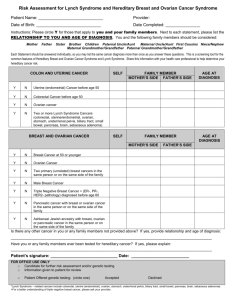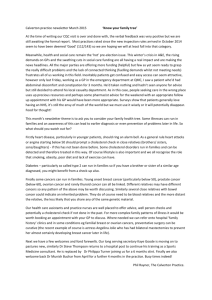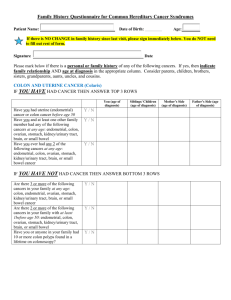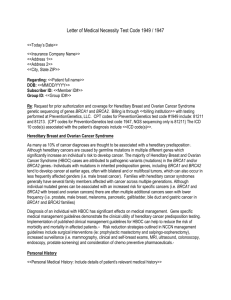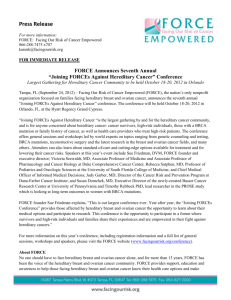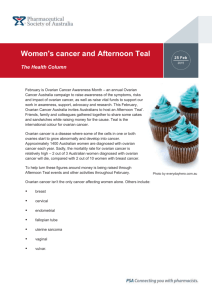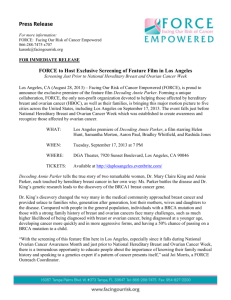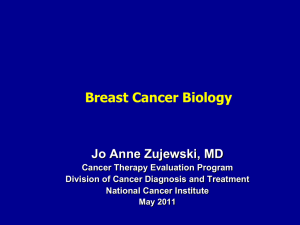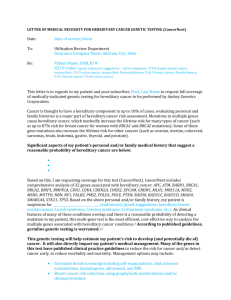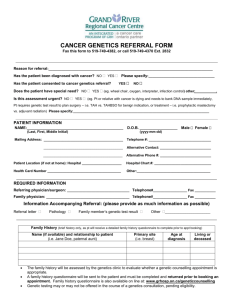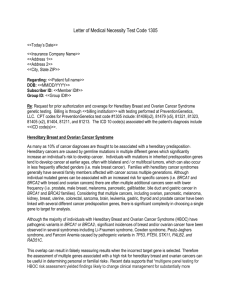SAMPLE LETTER OF MEDICAL NECESSITY – myRisk NOTE TO
advertisement
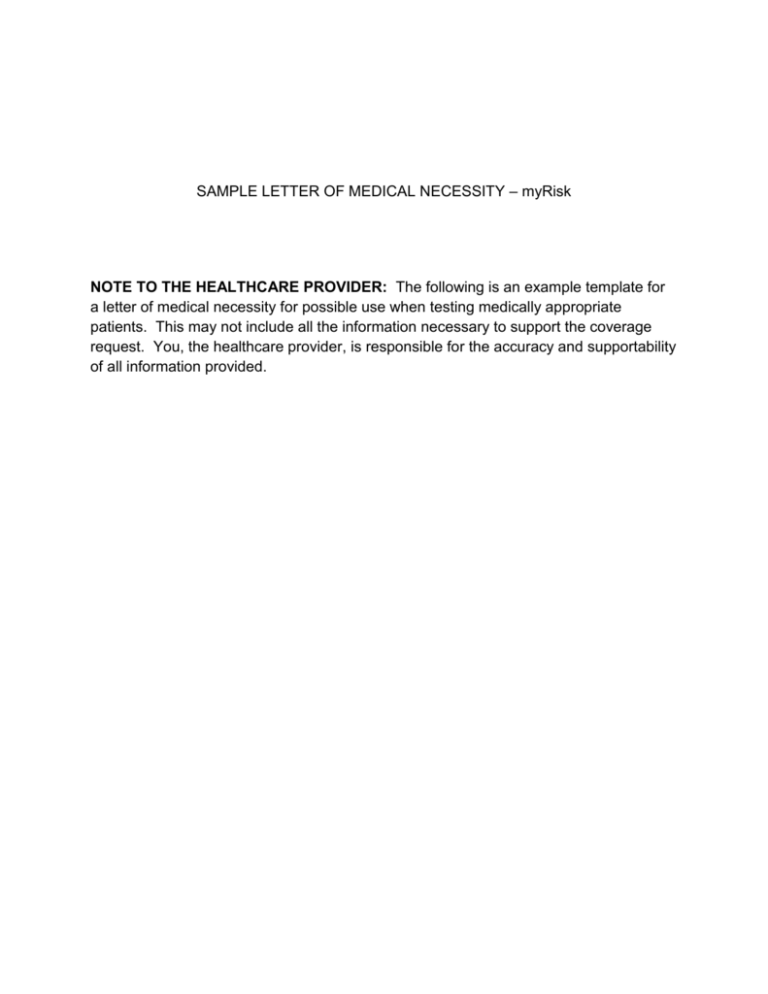
SAMPLE LETTER OF MEDICAL NECESSITY – myRisk NOTE TO THE HEALTHCARE PROVIDER: The following is an example template for a letter of medical necessity for possible use when testing medically appropriate patients. This may not include all the information necessary to support the coverage request. You, the healthcare provider, is responsible for the accuracy and supportability of all information provided. [Physician Letterhead] [Date] ATTN: [Physician Name, M.D.] [Medical Director] [Insurance Company/Institution] [Street Address] [City, State, Zip] Re: [Patient Name, Date of Birth, ID Number] Dear Medical Director: I am writing to request coverage for the above patient using the Myriad myRiskTM Hereditary Cancer multi-gene panel test. The genes included in the panel include BRCA1, BRCA2, MLH1, MSH2, MSH6, PMS2, EPCAM, APC, MUTYH, CDKN2A, CDKN2B, CDK4, TP53, PTEN, STK11, CDH1, BMPR1A, SMAD4, PALB2, CHEK2, ATM, NBN, BARD1, BRIP1, RAD51C, and RAD51D. I have determined that this test is medically necessary for the above patient due to the following history, which is suggestive of a hereditary cancer syndrome consistent with a mutation in multiple genes. The myRiskTM test has increased sensitivity compared to testing individually for only Hereditary Breast and Ovarian Cancer syndrome (BRCA1, BRCA2) and/or Lynch syndrome (MLH1, MSH2, MSH6, PMS2, EPCAM)1,2. Each of the genes on the panel is associated with a level of cancer risk that may indicate altered medical management of this patient. Patient History: [choose one or both of the following tables] [Relevant cancers include: breast, ovarian, colorectal, endometrial, melanoma, pancreatic, gastric, and prostate; specify maternal or paternal relatives; specify bilateral or multiple primary cancers; indicate if breast tumors are triple negative, or if colon/endometrial tumors are MSI-high or IHC abnormal.] Personal History Cancer or Polyp Site (number/type of polyp) Dx Age Family History First-, Second-, or Third-Degree Relative (Maternal Side or Paternal) Relationship Cancer or Polyp Site (number/type of polyp) Dx Age [Cut if not applicable to your patient] This patient has not been affected with cancer, but has a family history of cancer strongly suggestive of a hereditary cancer syndrome. My patient’s relatives who have had an associated cancer are not available for testing because: [choose one] _____ They are deceased _____ My patient does not have any contact with the affected relatives _____ The affected relatives have refused testing or have specifically refused to share their testing history or results with my patient _____ Other: _________________________________________________________________ Explanation of Need: Individuals who carry a mutation in one or more of these genes have an increased lifetime risk of breast, ovarian, colorectal, endometrial, melanoma, pancreatic, gastric, prostate, and/or other cancers. Several professional societies, including those listed below, have published guidelines for managing patients with elevated cancer risks that are associated with mutations in these genes. Therefore, test results are necessary in choosing the most appropriate course of treatment and/or surveillance for this patient. - National Comprehensive Cancer Network American College of Obstetricians and Gynecologists American Society of Clinical Oncology International Gastric Cancer Linkage Consortium International Cancer of the Pancreas Screening Consortium Hereditary cancer syndromes associated with these genes present with a wide spectrum of cancers with variable penetrance and ages of onset, thus making it difficult to determine appropriate single-syndrome testing. Therefore, a multi-gene panel increases the opportunity for at-risk individuals to be appropriately identified and receive necessary medical management. The National Comprehensive Cancer Network® (NCCN®) guidelines provide the option of a multi-gene (panel) test, when appropriate, in the algorithm to evaluate a high risk patient, because multiple genes may contribute to increased cancer risk3. The Society for Gynecologic Oncology (SGO) also recognizes the advantages of cancer gene panels in decreasing cost and improving efficiency of cancer genetic testing4. For this patient, the genetic test results are needed in order to consider the following medical management strategies: [Please specify] [Relevant management may include: breast surveillance, colonoscopy, upper endoscopy, surveillance for endometrial and ovarian cancer, prophylactic surgeries, chemoprevention strategies, etc.] Medical Management Considerations Informed Consent: The patient has provided informed consent to pursue genetic testing, based on my discussion of the personal and/or family history, the potential test results, and the implications for medical management. Please do not hesitate to contact me if I can provide you with any additional information. Sincerely, [Physician Signature and Name] ____________________________ 1 Tung N, et al. Cancer 2014 Yurgelun MB, et al. J Clin Oncol 2014 (suppl; abstr 1509). 3 NCCN Clinical Practice Guidelines in Oncology. Genetic/Familial High-Risk Assessment: Breast and Ovarian v2.2014. 4 SGO Clinical Practice Statement: Next Generation Cancer Gene Panels Versus Gene by Gene Testing. March 2014. 2
